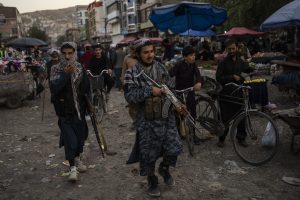The Taliban have been working hard to project a moderate image, promising that they have changed since they last ruled Afghanistan in the 1990s. To that end, one of their first orders of business after seizing Kabul was the proclamation of a general amnesty for all, including those who worked with the “opposition” or supported the “occupiers.”
It is hard to overstate the irony of this declaration considering the violence and bloodshed that the Taliban have inflicted on ordinary citizens in Afghanistan for more than 20 years. Most Afghans legitimately expected the Taliban to seek pardon from them, not the other way around.
Weary of decades of war, Afghanistan enacted an Amnesty Law in 2007. That law was invoked in the 2016 peace deal with Hezb-e-Islami, previously designated a terrorist group. The deal granted immunity to the group, including its leader Gulbuddin Hekmatyar, a notorious warlord accused of numerous atrocities, in exchange for abandoning violence. The Taliban, however, never showed genuine interest in a similar accord.
Buoyed by a feckless and at times conniving Afghan government — former Presidents Hamid Karzai and Ashraf Ghani released thousands of Taliban convicts, many of whom had perpetrated grave crimes, and supported the insurgents in other ways — the Taliban saw little reason to negotiate in good faith.
Acting in good faith continues to elude the Taliban, even with respect to their own so-called “amnesty” policy.
Despite wielding power for just a few weeks now, there is already mounting evidence of Taliban retribution. According to a confidential threat assessment for the United Nations, the Taliban have been intensifying their hunt for former Afghan security officials and people who may have worked with U.S. or NATO forces. The Taliban reportedly executed the brother of former Vice President Amrullah Saleh. Multiple sources have confirmed that the Taliban executed senior police officials in Farah and Badghis provinces. The Taliban also stabbed a pregnant policewoman to death in front of her family in Ghor.
Even former civil servants who did not work in the security sector are reportedly being targeted. The Taliban are also reportedly harassing the stranded family members of officials who have left the country. The group has also been intimidating, torturing, and killing Afghan journalists and their relatives.
In Panjshir, where the Taliban have faced resistance, the group killed at least 20 civilians. Evidence indicates that the Taliban tortured non-combatants and prevented the burial of victims. Besieged by the militants, the people in Panjshir face a dire humanitarian crisis as food and medicine are increasingly scarce.
In Ghazni, the Taliban committed a gruesome massacre of nine Hazara civilians after taking control of the province. Six men were shot and three were tortured to death, including one man who was strangled with his own scarf and had his arm muscles sliced off.
The massacres in Panjshir and Ghazni share other disturbing parallels as well. In both cases, the Taliban sought to minimize exposure by severing communications with the outside world. Access to electricity, phone service, and the internet were curtailed severely. (One man was reportedly killed on the mere suspicion of selling sim cards in Panjshir.) The media and human rights groups were also barred from covering these regions during those incidents. The Taliban denied responsibility for the killings.
These tactics suggest that the scale of atrocities is likely much more widespread than the available evidence from Taliban-controlled Afghanistan indicates so far. The premeditated and systematic nature of these attacks further suggests the existence of an organizational policy and approval from high-level commanders and leaders. These factors, juxtaposed against the Taliban’s public pronouncements concerning leniency, warrant suspicion with respect to the Taliban’s credibility and motivations.
The Taliban’s newly-announced government similarly fails to inspire confidence in their willingness or capacity to honor stated commitments. The militant group’s all-male cabinet is filled with hardliners, some on international sanctions lists and suspected of gross human rights violations. For instance, the task of maintaining law and order, including enforcing the amnesty scheme, is entrusted to Interior Minister Sirajuddin Haqqani, the head of the notorious Haqqani Network believed to be behind numerous deadly attacks in Afghanistan. The Haqqani Network, which maintains close ties to al-Qaida, is a U.S.-designated foreign terrorist organization. The FBI has offered $10 million for information leading to the new interior minister’s arrest.
The Taliban’s duplicity regarding their amnesty program is not unprecedented. The insurgent group declared a similar clemency pledge when they first captured Kabul back in 1996. That pledge, however, did not dissuade the group from committing grave atrocities, including the massacre of thousands of Hazara civilians in Mazar-i Sharif in 1998.
The Taliban’s mass killing of Hazaras in Mazar-i Sharif bears resemblance to the recent massacres in Panjshir and Ghazni. Besides their false assurance of amnesty, the Taliban barred journalists and human rights organizations from entering Mazar-i Sharif in the late 1990s as they methodically executed thousands of Hazara civilians. When confronted with the report of atrocities, the Taliban dismissed the findings of U.N. human rights investigators as propaganda.
While the Taliban’s PR machine has grown more sophisticated since the 1990s, their core ideology and modus operandi remain unaltered and continue to inspire other Islamist militant groups. Their perfidious amnesty policy reveals the Taliban’s true nature, and underscores the ever-rampant culture of impunity in Afghanistan.

































